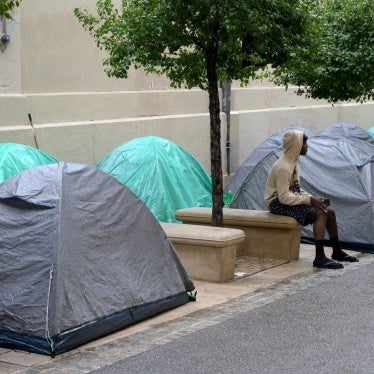The Kyrgyz government today violated international law by forcibly returning four Uzbek refugees and one asylum seeker to Uzbekistan, putting their lives and well-being at risk, Human Rights Watch said.
This action signals Kyrgyzstan’s disturbing willingness to flout its international commitments to protect asylum seekers and refugees on its territory. Hundreds of other Uzbeks seeking asylum in Kyrgyzstan are at great risk as Uzbekistan presses the Kyrgyz government to send them back. The five Uzbeks had been in custody after Uzbekistan filed a request for their extradition. Human Rights Watch called on the international community to redouble efforts to prevent additional forced returns.
“The Kyrgyz government has deliberately and forcibly sent refugees back to Uzbekistan, where they face likely torture and persecution,” said Holly Cartner, Human Rights Watch’s Europe and Central Asia director. “This is an appalling move that sets a terrible precedent throughout the region. We condemn it in the strongest terms.”
Today at about 3 p.m. (9 a.m. GMT), Kyrgyz officials drove the four Uzbek refugees and one asylum seeker across the Kyrgyz-Uzbek border near Dostuk. The four Uzbek refugees were Jahongir Maksudov, Rasul Pirmatov, Odiljon Rahimov and Yakub Tashbaev. The asylum seeker, Fayezjon Tajihalilov, was registered with the United Nations High Commissioner for Refugees (UNHCR).
Kyrgyz authorities did not notify UNHCR or the men’s lawyers in advance of the forced return. UNHCR learned after the fact that the Kyrgyz Ministry of Internal Affairs and officials from the prosecutor general’s office were responsible for handing the men over to Uzbek law enforcement agents.
The five men were among more than 400 Uzbeks who fled to Kyrgyzstan following the massacre in Andijan on May 13, 2005. The four designated refugees had been in custody since they were detained by Kyrgyz authorities on June 9, 2005, following an extradition request by Uzbekistan. Fayezjon Tajihalilov was taken into custody on October 20, 2005. The Uzbek government has accused them of involvement in acts of violence during the Andijan events.
The UNHCR office in Bishkek recognized the four men as refugees and found countries willing to resettle them in safety. By June the Kyrgyz Supreme Court upheld decisions taken by the Department of Migration Services denying the men’s applications for refugee status, which left the decision on the men’s fate in the hands of the prosecutor general.
Throughout the past year, the United Nations, the European Union and the United States had urged Kyrgyzstan to refrain from returning the four refugees. In the conclusions issued following the annual meeting held between the European Union and the Kyrgyz government in July, the European Union expressed “its strong concern over the fate of the … four [refugees], urging the Kyrgyz side to respect its international obligations and release them to UNHCR for resettlement.”
At the same time, the Uzbek government pressed the Kyrgyz authorities to return the four. The presidents of Kyrgyzstan and Uzbekistan, Kurmanbek Bakiev and Islam Karimov, are expected to meet in Tashkent next month.
“It appears that the Kyrgyz government traded the safety of these men to gain the goodwill of Uzbekistan’s president, Islam Karimov,” said Cartner. “If that’s the case, it bodes ill for the hundreds of Uzbek refugees who remain in Kyrgyzstan.”
The return of the five violates the 1951 Refugee Convention, which bans the return of refugees and asylum seekers to countries where they face persecution (refoulement). Kyrgyzstan ratified the convention in 1996. Because the men are likely to face torture in Uzbekistan, returning them also violates the absolute prohibition on the return of persons to places where they risk torture, contained in the Convention Against Torture, which Kyrgyzstan ratified in 1997.
In 2003, the U.N. Special Rapporteur on Torture, Theo van Boven, published a report declaring that torture was “systematic” in Uzbekistan.
“We continue to receive credible reports of torture in Uzbekistan,” said Cartner. “These five men are at grave risk of torture because they are charged in relation to the Andijan events.”
Several human rights organizations, including Human Rights Watch, have documented the Uzbek government’s efforts to conceal the truth about the Andijan killings and to manufacture evidence that would support the official version of events, shifting blame for the bloodshed away from government troops. In dozens of cases, authorities have coerced “confessions” from individuals, using torture and other inhuman and degrading treatment. More than 250 people have been convicted in a series of trials on the Andijan events, all but one of which were held behind closed doors. The one trial that was open to monitors fell far short of international fair trial standards.
Russia and Kazakhstan are also holding in custody Uzbek refugees whose extradition is sought by the Uzbek government. Last week, the Russian prosecutor general announced that he had signed an extradition order for 13 refugees – 12 Uzbeks and one Kyrgyz – who are also wanted in connection with the Andijan events. The men’s lawyers are appealing the extradition order and have requested an injunction against the extradition from the European Court of Human Rights. At least one Uzbek refugee is in custody in Kazakhstan, pursuant to an Uzbek extradition request alleging he is a religious “extremist” wanted on charges of terrorism.
“Throughout the region, Uzbek refugees are at risk of being illegally sent back to Uzbekistan,” said Cartner. “The United States, the European Union and others must prevail on these governments not to send these refugees back to persecution and almost certain torture. They must also demand that the Uzbek government grant international monitors immediate access to the five.”






